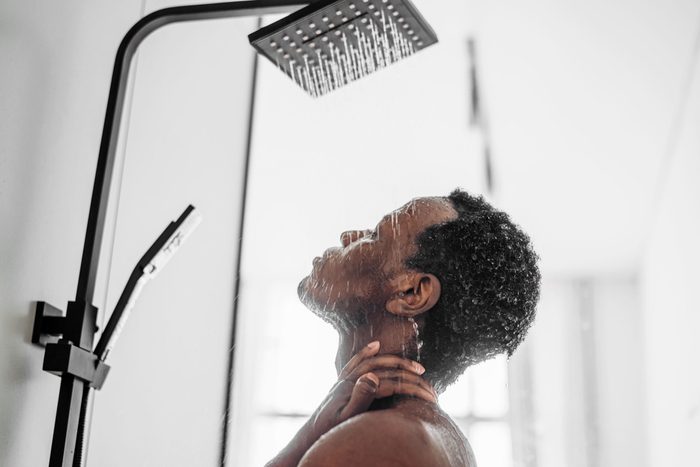
You might already know that your body hosts a bustling ecosystem of bacteria that’s both a sign of, and a player in, your overall health. Just like Harvard Health says your digestive system houses an astounding 100 trillion beneficial and harmful bacteria, similarly, your skin is home to about 1,000 species of bacteria. You don’t see them, at least not without a microscope but they too are both an impact on, and a reflection of, aspects of your health. One of those clues is body odor.
Lisa Pfingstler, MD, a board-certified dermatologist in Pennsylvania, explains the mechanism that makes us sometimes smell less than fresh: “Sweat itself is actually odorless,” Dr. Pfingstler says. “It is the reaction of the sweat hitting the skin, where there is often bacteria and other buildup of skin cells, that causes the odor.” This occurrence is known as bromhidrosis, or “smelly sweat.”
We’ve all had those Is that me? moments of sudden, embarrassing awareness of our body odor. Sometimes, the smell can even have a sharp, vinegar-like quality. Keep reading—Dr. Pfingstler explains what’s possibly going on.
Get The Healthy by Reader’s Digest newsletter
Influences for how our sweat smells
According to the Cleveland Clinic, several factors play a role in the smell of perspiration, including your diet, hormonal changes, and underlying health conditions. These elements can alter the composition of your sweat, sometimes resulting in that vinegar-like scent.

If your sweat smells like vinegar, experts explain the causes:
1. Hygiene
First things first: Hygiene plays a pivotal role. To Dr. Pfingstler’s point, often, the culprit behind that vinegar-like odor is simply an excess of bacteria on your skin. When bacteria mingle with sweat, they can produce this sharp scent.
Dr. Pfingstler explains that when the bacteria build-up, along with dead skin cells known as the stratum corneum, they can block your sweat glands. To manage this condition, she recommends using antibacterial washes to reduce bacteria levels rather than attempting to stop sweating—after all, there are biological benefits to sweating.

2. Diet
There’s truth to the saying, “You are what you eat.” According to Christine Lee, MD, a board-certified gastroenterologist at the Cleveland Clinic, certain foods that are high in sulfur compounds can significantly alter your body odor. These compounds are found in foods like garlic, onions, red meat, and cruciferous vegetables such as broccoli and cabbage, as well as in spices and seasonings like curry, cumin, and fenugreek.
These ingredients contain sulfuric compounds that, when digested, can impart a strong scent that is carried out through your sweat.

3. Hyperhidrosis
Excessive sweating, known medically as hyperhidrosis, can heighten body odor issues, explains the Cleveland Clinic. This condition often affects the eccrine sweat glands, leading to damp palms of the hands and soles of the feet, which some patients report can be uncomfortable and may even increase the likelihood of fungal infections.
However, Dr. Pfingstler points out that the odor is not a direct result of hyperhidrosis, since sweat is naturally odorless. The unpleasant smell arises when the excess sweat interacts with bacteria on the skin.

4. Trichomycosis
Trichomycosis is a bacterial infection that affects the hair shafts, particularly in sweat-prone areas such as the armpits. Dr. Pfingstler notes that this condition can lead to a distinct vinegar-like odor as the bacteria break down sweat on the skin.

5. Stress
The International Hyperhidrosis Society explains that emotional responses, such as stress, trigger sweat from the apocrine glands. This type of sweat is richer and contains fatty acids and proteins, which make it slower to evaporate.
While initially odorless, stress-induced sweat can develop a noticeable smell as it interacts with skin bacteria, leading to increased body odor.

6. Hormonal changes
Hormonal changes, such as those during puberty, menstruation, pregnancy or menopause, can alter how much you sweat.
“With hormonal shifts like the ones we go through during puberty, people get stinky,” shares Claire Hamp, CNM, a certified nurse midwife at the Cleveland Clinic. “There are big hormonal shifts in pregnancy and postpartum. That adjustment changes how much we sweat and how (and how strongly) we smell.”
After childbirth, levels of estrogen and progesterone plummet dramatically. While the exact reasons are unclear, this hormonal dip often triggers a signal in your brain that you’re overheating, leading to increased sweating—and potentially, more scent.

7. Kidney disease
Kidney disease can lead to uremia, a condition in which urea and other waste products accumulate in the blood because the kidneys are unable to process them efficiently. As these waste products are expelled through the skin, they can give the sweat a sharp, acidic, or ammonia-like odor, often described as vinegary.

8. Diabetes
High blood sugar levels can cause changes in body odor, including making sweat smell vinegar-like. This is largely because the body metabolizes substances when insulin levels are abnormal. The American Diabetes Association notes that people with elevated glucose levels often have dry skin, which struggles more to ward off bacteria, increasing the risk of infections. To help manage this, it’s important to keep your skin clean and dry and to avoid overly hot baths and showers.

How to treat sweat that smells like vinegar
If you’re dealing with sweat that has a vinegar-like odor, there are several steps you can take:
- Maintain proper hygiene
- Use antiperspirants and antibacterial washes
- Reduce the intake of foods known to cause body odor
- Wear breathable clothing
- Manage stress levels
Finally, and most importantly, if your sweat consistently has a strong odor despite your best efforts, it’s time to see your doctor. They can evaluate you for underlying issues like hyperhidrosis, hormonal imbalances or metabolic disorders such as diabetes and ensure you get the appropriate treatment for your condition.
For wellness updates delivered daily, subscribe to The Healthy by Reader’s Digest newsletter and follow The Healthy on Facebook and Instagram. Keep reading:
